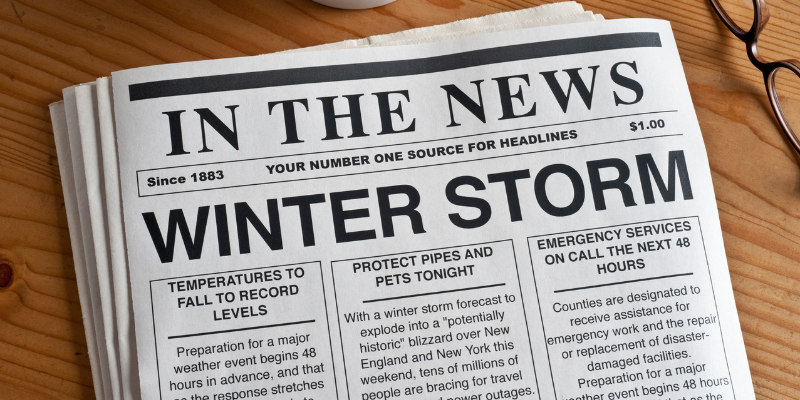September is National Preparedness Month, which comes at a critical juncture as we transition into the colder months, a time renowned for increased weather-related emergencies in Connecticut. A well-informed community that takes adequate steps in preparation is more likely to weather Mother Nature’s challenges. As a homeowner in Connecticut, the onset of fall is a call to action to fortify your home and ensure the safety of your loved ones.
This includes getting provisions, securing medical supplies, and ensuring a stable backup energy source. Here’s a helpful list to prepare you (PS – print this out and save it!):
A Vital Resource: Water
The first step to preparing for a potential disaster is ensuring a sufficient water supply. It is recommended to stock at least one gallon of water per person per day for at least three days. This supply will cater to your drinking, cooking, and hygiene needs. Consider increasing this stockpile for households with pregnant women, nursing mothers, and those with medical conditions. It’s prudent to store water in food-grade water storage containers to preserve the quality for extended periods.
Stocking Up on Shelf-Stable Foods
Equally important is a well-stocked pantry of shelf-stable foods that will keep your family fed in the event of a disaster. Here’s a brief guideline on choosing the right foods:
- Canned Goods: Consider stocking up on canned vegetables, fruits, beans, and meats which have a longer shelf life. Don’t forget a manual can opener.
- Dry Foods: Dry foods like rice, pasta, and lentils are great additions as they are easy to store and can last for a considerable period.
- Snacks: Incorporate high-energy snacks such as granola bars, dried fruits, and nuts which can provide quick energy.
- Special Dietary Needs: Be sure to include foods that cater to the dietary needs of family members with restrictions.
- Don’t forget your pets!
Essential Medicines and First Aid
An essential yet often overlooked part of disaster preparedness is the medicine cabinet. Here’s how you can prepare:
- Prescription Medications: Ensure you have a sufficient supply of prescription medications for at least a week.
- First Aid Kit: Assemble a comprehensive first aid kit with bandages, antiseptics, a thermometer, pain relievers, and any other necessary items.
- Personal Hygiene: Stock up on personal hygiene products including hand sanitizers, wet wipes, and feminine hygiene products.
Energy Backup: Keeping the Lights On
Power outages are common during natural disasters, and backup energy solutions are vital.
- Generators: Investing in a generator can keep your essential appliances running during power outages. Ensure you have enough fuel to run the generator for several days. Reminder to NEVER put your generator inside the house, close to a window – it must be used outside in a well-ventilated area.
- Battery-Powered Items: Stock up on battery-powered items such as flashlights, radios, and portable chargers. Remember to have extra batteries on hand.
- Alternative Heating Sources: Consider having alternative heating sources like wood-burning stoves to stay warm if the power goes out in winter.
Winter-Specific Preparations
As we segue into the colder seasons, extra precautions are warranted to face Connecticut’s harsh winter weather:
- Insulation: Ensure your home is adequately insulated to retain heat and reduce energy consumption. That includes windows and doors – are there spaces that will let the cold air in?
- Roof and Gutters: Clear your roof and gutters of leaves and debris to prevent water damage and ice dams.
- Emergency Kits for Vehicles: If you must travel, have an emergency kit in your vehicle which includes items like blankets, water, non-perishable food, a first-aid kit, and a multi-purpose tool.
- Tree Maintenance: Trim branches hanging too close to your home to prevent them from causing damage during storms.
Developing a Family Emergency Plan
Having a well-thought-out emergency plan can be a lifesaver during a disaster:
- Communication: Establish a family communication plan that includes emergency contacts and designated meeting places in case you get separated.
- Evacuation Routes: Familiarize yourself with local evacuation routes and have a pre-planned exit strategy.
- Pet Care: Include plans for the care and safety of your pets as well.
- Important Documents: Store important documents, such as insurance policies and medical records, in a waterproof container that can be easily accessed in case of an evacuation.
Education and Community Involvement
As a part of the Connecticut community, consider involving yourself in community preparedness programs. Learn about the potential hazards in your locality and actively participate in community drills and education forums.
Moreover, National Preparedness Month is an excellent time to educate younger family members about the importance of safety and preparedness.
You never know when that first N’oreaster will show up here in Connecticut – so take the time now during the gorgeous fall weather to prepare. Better safe than sorry!

